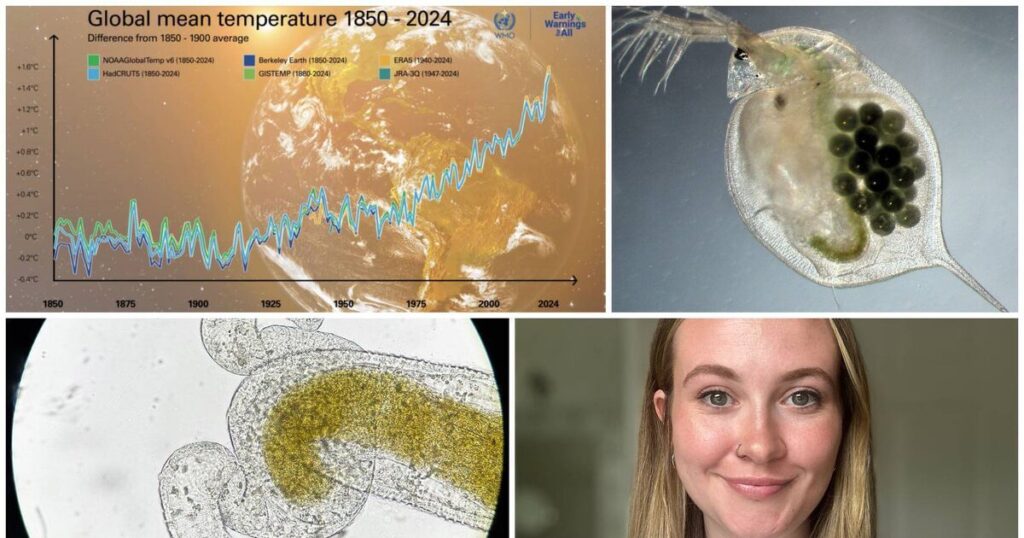New research from scientists in Ireland strongly implies that heatwaves have a major influence on the spread of many diseases.
Specifically, the scientists have discovered that differences in heatwaves — such as how much hotter they are than normal temperatures, and how long they last — can increase disease burden by up to 13 times in a commonly used experimental animal model.
Their discovery and its implications come at an important time, with global climate change and related extreme weather events continuing to impact many in various ways (temperatures approached 50°C in Pakistan last month, while a cold snap in South Africa approached freezing conditions).
Given the increased frequency and intensity of heatwaves in particular, it’s crucial to understand how these events will affect the spread of disease.
While scientists have a relatively good idea of how temperature impacts some viruses and disease-causing pathogens and parasites, they know much less about the effects of sudden heatwaves or cold snaps, or how influential variation in the duration of these events are.
That is what the scientists behind the new research, just published in the leading international journal PLOS Climate, set out to explore.
First author, Niamh McCartan, a PhD candidate from Trinity College Dublin’s s School of Natural Sciences, noted:
“From a bigger-picture perspective, this work underlines the need for more detailed, context-specific models to help better predict the likely impact of heatwaves and climate change on different diseases. We now know that amplitude, duration, baseline temperature and the point at which exposure occurs have differing effects in shaping disease outcomes, so overly simplified models may miss critical complexities. For example, other researchers have suggested almost 70% of covid-19 cases in the summer of 2022 could have been avoided if there hadn’t been heatwaves around that time — imagine the difference that a better understanding of how heatwaves alter disease dynamics could have made to countless people.”
The results revealed that complex interactions exist between heatwave attributes and baseline temperatures, which in turn drive context-dependent effects on both pathogen prevalence and proliferation.
Perhaps most importantly, when compared to other types of temperature variation (such as cold snaps), heatwaves behave differently — altering parasite burden up to 13-fold, and thus driving significant variation in infection outcomes.
Niamh McCartan explained: “In this study, we worked with the water flea (Daphnia magna) and a microsporidian pathogen (Ordospora colligata), which are a widely used model for environmentally transmitted diseases, to investigate the impacts of different heatwave attributes. We manipulated the amplitude and duration of heatwaves across four average temperatures and four distinct time points at which the hosts were exposed to the pathogen. This approach gave us 64 unique heatwaves for comparison.”
“A recently published study reported that 58% of human pathogenic diseases have been aggravated by climate change, with temperature changes impacting host susceptibility due to altering biological properties such as how our immune systems function, as well as our behaviour.”
“Climate change is also causing mosquito species that carry diseases like dengue, Zika, and malaria to be increasingly found in parts of southern and central Europe, including Italy and France, areas that were previously too cool to support them. While Ireland has so far been less affected, the findings of our study highlight the urgent need to understand how warming and extreme weather events can alter disease dynamics more broadly.”
“With all of this in mind, it’s important that future disease-specific models must account for fluctuating and extreme temperatures, not just averages.”
In addition to this big-picture perspective, the findings of this work also have more specific, valuable insights for freshwater ecology, given that the water flea plays an important role in freshwater food webs, helping to support numerous other species that use them as a food source. In other cases, when their numbers plummet, algae can take over and negatively impact water quality, which in turn has a suite of negative, knock-on effects.
- This work was funded by a Research Ireland (formerly Science Foundation Ireland) Frontiers for the Future award.


